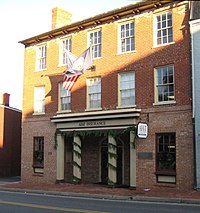Fusion Energy Foundation

Offices of Fusion Energy Foundation and other LaRouche entities in Leesburg, Virginia
|
|
| Abbreviation | FEF |
|---|---|
| Formation | 1974 |
| Extinction | 1986 |
| Type | Non-profit |
| Legal status | Defunct |
| Headquarters | 231 West 29 St., New York, NY (1974–1984) 20 South King St., Leesburg, VA (1984–1986) |
|
Founder
|
Lyndon LaRouche |
|
Main organ
|
Fusion |
| Affiliations | LaRouche movement |
Fusion Energy Foundation (FEF) was an American non-profit think tank co-founded by Lyndon LaRouche in 1974 in New York. It promoted the construction of nuclear power plants, research into fusion power and beam weapons and other causes. The FEF was called fusion's greatest private supporter. It was praised by scientists like John Clarke, who said that the fusion community owed it a "debt of gratitude". By 1980, its main publication, Fusion, claimed 80,000 subscribers.
The FEF included notable scientists and others on its boards, along with LaRouche movement insiders in management positions. It published a popular magazine, Fusion, and a more technical journal as well as books and pamphlets. It conducted seminars and its members testified at legislative hearings. It was known for soliciting subscriptions to their magazines in U.S. airports, where its confrontational methods resulted in conflicts with celebrities and the general public.
The FEF has been described by many writers as a "front" for the U.S. Labor Party and the LaRouche movement. By the mid-1980s, the FEF was being accused of fraudulent fundraising on behalf of other LaRouche entities. Federal prosecutors forced it into bankruptcy in 1986 to collect contempt of court fines, a decision that was later overturned when a federal bankruptcy court found that the government had acted "in bad faith". Key personnel were convicted in 1988.
According to an article in The Nation, the Fusion Energy Foundation had physicists, corporate executives, and government planners on its board of advisors, many unaware of the foundations connection to the U.S. Labor Party, while the board of directors was filled with LaRouche movement regulars and some party outsiders. A 1983 report published by The Heritage Foundation said that the foundation briefly gained the confidence of respected scientists who lent their reputations to it but it warned that they risked their reputations by doing so.
...
Wikipedia
